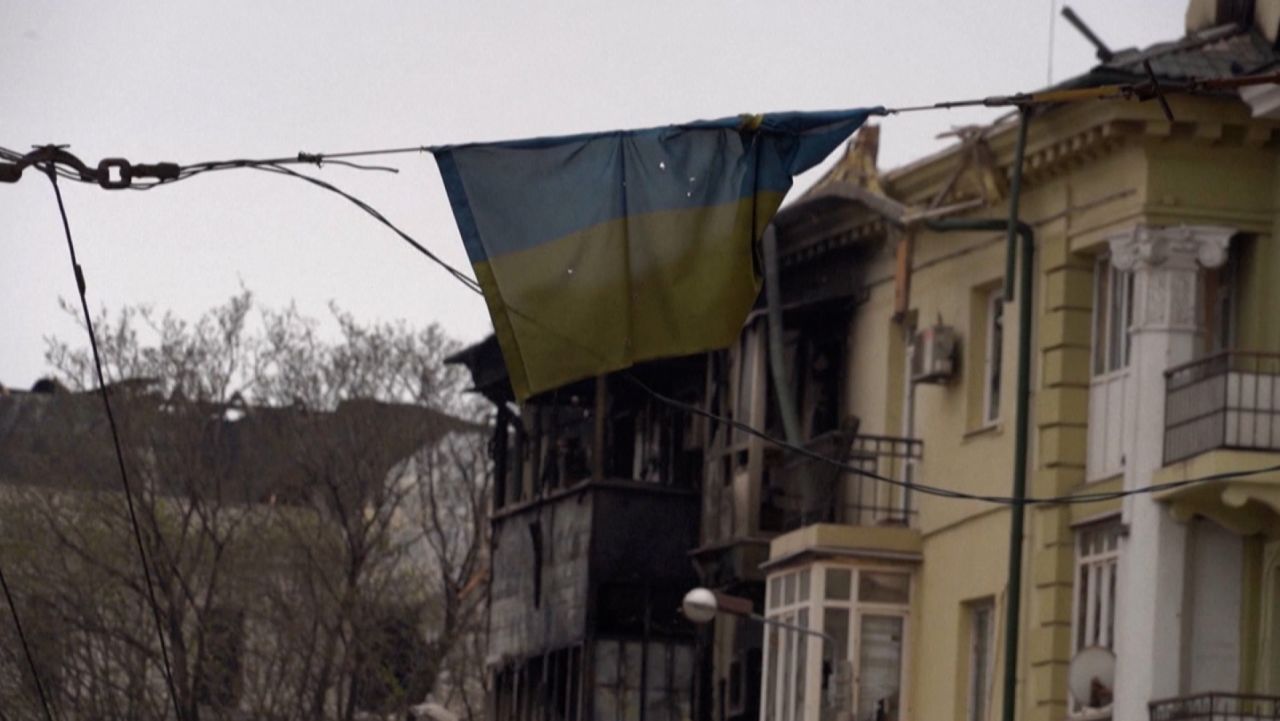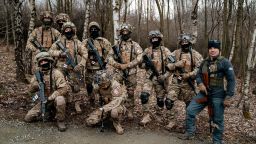Thursday marks 50 days since the Russian invasion of Ukraine, and there has been a marked shift in Moscow’s approach. Ukrainian officials have warned for days they expect a major offensive by Russian forces in the eastern Donbas region.
The US and EU have pledged a combined $1.3 billion more in military aid for Ukraine as Russia prepares to launch an eastern offensive.
Meanwhile, organizations like the United Nations have warned that the prolonged war in Ukraine could lead to more problems in an already struggling global economy with food insecurity as a top concern.
Here are the latest developments:
Casualties of war: As of April 12, the civilian death toll in Ukraine since the Russian invasion began on Feb. 24 stood at 1,932, the UN Human Rights Office (OHCHR) said Thursday. It warned that “the actual figures are considerably higher.”
Global impact: The United Nations secretary-general has warned that the world is on the brink of a “perfect storm” as the war in Ukraine exacerbates an already struggling global economy. In a news release Wednesday, the UN said the war could lead to a “three-dimensional crisis” of food, energy and finance — areas that have already been hit hard by Covid-19 and climate change. “We are now facing a perfect storm that threatens to devastate the economies of developing countries,” Secretary-General António Guterres said.”The people of Ukraine cannot bear the violence being inflicted on them. And the most vulnerable people around the globe cannot become collateral damage in yet another disaster for which they bear no responsibility,” he said.
Key Russian warship damaged: One of the Russian Navy’s most important warships has been badly damaged in the Black Sea, a massive blow to a military struggling against Ukrainian resistance 50 days into Russia’s invasion of his neighbor. Russian sailors evacuated the guided-missile cruiser Moskva, the flagship of its Black Sea fleet, after a fire that detonated ammunition aboard, Russia’s defense ministry said. Ukraine’s Operational Command South claimed Thursday that the Moskva had begun to sink after it was hit Ukrainian Neptune anti-ship missiles. Russia’s defense ministry said Thursday that the Moskva “remains afloat” and that measures were being taken to tow it to port. The ministry said the crew had been evacuated to other Black Sea Fleet ships in the area. Pentagon press secretary John Kirby told CNN’s Brianna Keilar that “there was an explosion” on the Moskva, but said the United States cannot say at this point if the ship was hit by a missile. Whatever the reason for the fire, analysts say it strikes hard at the heart of the Russian Navy as well as national pride, comparable to the US Navy losing a battleship during World War II or an aircraft carrier today.
Ukrainian National Security Advisor Oleksiy Danilov told CNN Thursday that the alleged strike on the cruiser was a very important mission for his country’s military and vowed there would be more such dramatic actions. “It is a very important mission for us. The Moskva was there near the Snake Island and was hit yesterday by two powerful Ukrainian-made missiles,” Danilov told CNN’s Frederik Pleitgen in an interview. “[Putin] came to kill our children, our women, our civilians. That is our gift to him. And this is just the beginning. There will be more than one Moskva.” The Ukrainian national security advisor went on to commend the Ukrainian military for the way they were defending the country but cautioned against underestimating the Russian military. Danilov also reiterated his country’s request for the international community to send more weapons. “We are, first of all, grateful for what we already have been given,” he said “We need helicopters, planes, powerful weapons, howitzers… We need a lot.”
Potential meeting between Zelensky and Putin: Turkey is still working on organizing a meeting between Russian President Vladimir Putin and his Ukrainian counterpart Volodymyr Zelensky, Turkish Foreign Minister Mevlut Cavusoglu told Turkish news channel NTV on Thursday.“We know critical topics will be decided at leader level, so we will try to bring leaders together,” he said. Cavusoglu said that Turkey continues to approach the negotiations with “cautious optimism,” particularly after recent events of alleged war crimes in Bucha and Irpin which “negatively affected the process.”
The condition for a possible meeting between Putin and Volodymyr Zelensky is an agreement document ready for the two leaders to sign, the Kremlin said Thursday. Since the start of Russia’s invasion, Zelensky has repeatedly called for talks with the Russian president, but there have been no talks at the highest level so far.
Russian opposition figure urges the West to wage a social media against Putin regime: Russian opposition figure Alexey Navalny has issued a series of tweets urging a new front of “truth and free information” against Russian President Vladimir Putin, whom he calls the “war criminal from the Kremlin.”
Navalny, who is serving a nine-year sentence in a Russian penal colony after being convicted of fraud last month, said in his tweets that “truth and free information hit Putin’s insane regime just as hard as Javelins,” the US anti-tank weapons being used by Ukrainian forces against Russian armor.
Increased international defense aid for Ukraine: The Pentagon is working to move the $800 million worth of weapons, ammunition and other security assistance for Ukraine announced by US President Joe Biden yesterday into Ukraine as quickly as possible, a senior defense official said Thursday. “We’re under no illusion of the size and the scale of this thing. But we’re also mindful of the clock. We know time is not our friend. And we’re going to do the best we can to move this, to move these shipments as fast as we can,” the official told reporters during an off-camera briefing.
The European Union has approved an additional 500 million euros ($544 million USD) for military equipment for the Ukrainian Armed Forces on Wednesday, according to a news release from the European Council of the European Union.
“The next weeks will be decisive. As Russia prepares for an offensive on the East of Ukraine, it is crucial that we continue and step up our military support to Ukraine to defend its territory and population and prevent further suffering,” said Josep Borrell, High Representative of the European Union for Foreign Affairs and Security Policy.

























